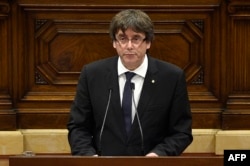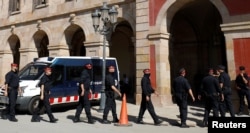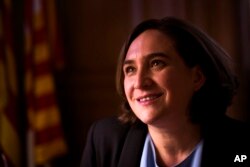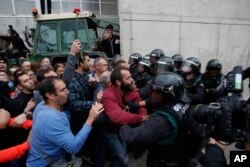Spanish Prime Minister Mariano Rajoy said Wednesday he wants clarification from the leaders of the semi-autonomous Catalonia region about whether they have declared independence.
Speaking after holding an emergency Cabinet meeting to discuss the secession push, Rajoy said such clarity was required by an article in Spain's constitution that would allow his government to suspend Catalonia's autonomy.
Wednesday's meeting came a day after Catalan leader Carles Puigdemont made a symbolic declaration of independence while suspending any formal steps, for now, in favor of seeking dialogue with the government in Madrid.
A spokesman for Rajoy's government said there could not be dialogue when the Catalan leaders had already decided they wanted to secede.
"The government rejects Catalonia's tacit declaration of independence," the spokesman said.
Puigdemont told regional lawmakers Tuesday night, “Today I assume the mandate for Catalonia to become an independent state in the form of a republic.”
Addressing a packed Catalan parliament, he also said, “The ballots boxes said yes to independence, and this is the only language we understand. We propose to suspend independence declaration to start dialogue in the coming weeks.” He was referring to the controversial October 1 plebiscite, which was declared illegal by the Spanish government and the country’s constitutional court.
Analysts said Puigdemont’s speech, in which he blamed Madrid for refusing to talk in the past and criticized the Spanish government for persecuting secessionists, will worsen the political crisis, the most dangerous to buffet Spain since a failed coup in 1981.
Rajoy threatened over the weekend to suspend the semi-autonomy of the restive northeast region, shutter Catalonia’s political institutions and impose direct rule from Madrid.
Puigdemont’s announcement Tuesday was delayed by more than an hour as dramatic last-minute appeals flowed in from Spanish leaders as well as from European capitals. Catalan politicians opposed to secession moved to delay Tuesday’s session of the Catalan regional parliament.
Just hours before the Catalan government met to hear Puigdemont speak, Rajoy said he couldn’t rule out drastic solutions to the challenge posed by Catalonia. Spain’s interior minister, Juan Ignacio Zoido, urged the Catalans to “get on the path of legality and the rule of law.”
European leaders joined in the appeals.
Donald Tusk, the president of the European Commission, called on Puigdemont not to divide Spain. He said he was speaking also as a member of an ethnic minority and “as a man who knows what it feels like to be hit by a police baton” - a reference to Madrid’s attempt to stop the October 1 independence referendum that triggered the confrontation between Catalonia and Madrid.
“Today I ask you to respect - in your intentions - the constitutional order and not to announce a decision that would make such a dialogue impossible,” he said.
Tusk urged restraint also on Spain, saying he had asked “Prime Minister Rajoy to look for a solution to the problem without the use of force. To look for dialogue. Because the force of arguments is always better than the argument of force.”
Puigdemont and other secessionist leaders had vowed to announce a breakaway state within 48 hours of the controversial October 1 plebiscite, which was declared illegal by the government and courts in Madrid.
More than 90 percent voted in the referendum to break with Spain, but the turnout was just over 40 percent and opinion polls have consistently suggested that more Catalans want to remain in Spain than want to secede.
An exodus of businesses, including two of Spain’s leading banks, a major telecommunications company and a construction group, as well as a massive weekend protest in Barcelona, the Catalan capital, by 350,000 Catalans opposed to separation, started to take its toll among moderate secessionists, who were alarmed at the prospects of economic collapse and civil unrest.
In the run-up to Tuesday’s announcement, they called for a pause and more efforts to open up negotiations with Rajoy, who is under pressure from his own party to maintain a strong line with the secessionists. Barcelona’s mayor, Ada Colau, argued Monday night against declaring independence, saying it would threaten Catalonia’s “social cohesion.”
She called for urgent negotiations and warned that Spain faced its “greatest institutional crisis” since its return to democracy following the death of General Francisco Franco in 1975.
The secessionists’ coalition, Together For Yes, commands only a thin majority in the Catalan parliament. The far-left Popular Unity Candidacy (CUP) urged Puigdemont to honor the result of the disputed referendum, pointing out that under the referendum law, the parliament passed ahead of the plebiscite, the legislature pledged to do so.
Even senior members of Puigdemont’s more moderate Catalan European Democratic Party have been urging caution in the past few days, including Ramon Tremosa, a member of the European Parliament.
He suggested following Slovenia’s strategy when it broke away from what was then Yugoslavia. Slovenia announced secession, but suspended implementation pending negotiations with its Yugoslav neighbors and European powers. That appears to be Puigdemont’s strategy.
Inching Catalonia closer to breaking away may still invite as firm a response from Madrid as an open declaration of independence.
Some analysts suspect Prime Minister Rajoy may invoke Article 155 of the constitution, which allows the central government to take control of an autonomous region, if it fails to “fulfill the obligations imposed upon it by the constitution or other laws, or acts in a way that is seriously prejudicial to the general interest of Spain.”
Article 155 has never been invoked before and it risks angering even more secessionist Catalans, who are still furious at the Spanish national police’s efforts to disrupt the independence referendum, in which officers raided polling stations, beat voters and fired rubber bullets at crowds. Thousands of Guardia Civil and national police who were deployed by Madrid to stop the vote have remained in the region.
Rajoy has warned he would do everything in his power to prevent Catalonia from breaking away. In an interview with Spain’s El País newspaper, he said, “We are going to prevent independence from occurring…I can tell you with absolute frankness that it will not happen.”
Pedro Sanchez, leader of the opposition Socialists, said Monday his party will support the government against any unilateral attempt to dismember the country.
Catalan leaders appear to be putting their hopes in international mediation, pressing European leaders to come to their aid.








